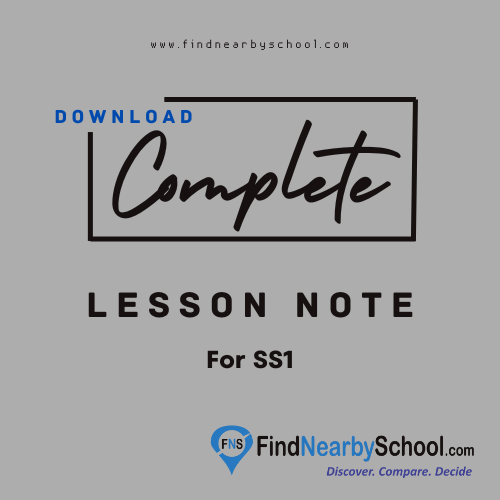Description
SS1 Food and Nutrition Scheme of Work for First, Second and Third Term: These lesson notes cover the following topics.
First Term:
| 1 | Introduction to food and nutrition –definition—importance of human nutrition- factors affecting human nutrition |
| 2 | Careers in food and nutrition |
| 3 | Relationship between food and nutrition to other subject |
| 4 | Basic food nutrient
–carbohydrate –functions of carbohydrate -food sources -symptoms of dietary deficiency |
| 5 | Basic food nutrient:
-protein -functions -food sources |
| 6 | Symptoms of dietary deficiency
-Fats and oils -functions -food sources -symptoms of dietary deficiency |
| 7 | Vitamins-water and fat soluble vitamins
-chemical names -functions of each vitamins -food sources -symptoms of food deficiencies |
| 8 | Mineral salts and water:
-Functions -food sources -symptoms of deficiencies |
| 9 | Symptoms of dietary deficiencies
-Symptoms, signs, causes and cure e.g. kwashiorkor, marasmus etc. |
| 10 | The Digestive System:
Meaning of Digestion, Absorption, Assimilation and Metabolism Digestion of food in the mouth, stomach and small intestines |
| 11 | Enzymes involved in Digestion
Absorption of nutrients, the role of water in digestion and absorption |
| 12 | Revision |
| 13 | Examination. |
Second Term:
1. Revision scientific study of foods.
a. Measurement: units of measurement.
b. Effects of heat on food.
2. Food tests (tests for carbohydrates, protein and fats),
– The food composition table.
– Meal planning.
3. Reproductive health.
4. Reproductive health –malnutrition e.g. Over nutrition and under nutrition.
5. Kitchen management.
6. Kitchen plan/ layout.
7. Kitchen equipment.
– Materials used in making kitchen equipment.
8. Cleaning agents and abrasives.
9. Safety in the kitchen.
a. Methods of handling kitchen equipment properly, precautions to prevent accident.
b. Contents and use first aid box.
c. Treatments of simple injuries e.g. Cuts, burns and scalds.
10. Hygiene.
a. Personal- rules of personal hygiene in the kitchen.
b. Kitchen hygiene rules.
11. Revision.
12. Examination.
Third Term:
1. Revision/ food hygiene
-food borne diseases, food sanitation law, food laws regulatory bodies e.g. NAFDAC, SON etc.
2. Cooking of food – definitions, reasons for cooking foods
– Methods of heat transfer
– Methods of cooking- moist heat method, definitions, advantages and disadvantages etc.
3. Dry heat method- definitions, advantages and disadvantages etc.
(b) Frying- types of frying, general rules for frying, advantages and disadvantages.
4. Food study: cereals/ grains – nutritive values of cereals and grains.
– processing
-high and low extraction rate flour, cooking methods etc.
5. Legumes/ pulses
– Importance , nutritive value, cooking methods and dishes made from legumes
6. Practicals on cooking methods, cereals and legumes.
7. Vegetables- types, nutritive values, factors affecting choice of vegetables, preparatory and serving of vegetables.
8. Fruits – types of fruits, nutritive value of fruits, factors affecting choice of fruits.
9. Practicals on fruits and vegetables
10. Meat cookery- types of meat from different animals, nutritive value of meats, methods of cooking meat.
11. Revision.
12. Examination.




Reviews
There are no reviews yet.